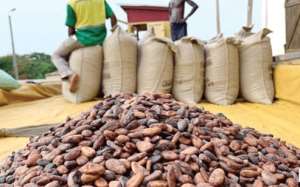
The government is expected to announce a new cocoa producer price before August 7, 2025, as anticipation builds ahead of the new crop season.
But while global cocoa prices remain near historic highs, the recent strengthening of the cedi may quietly place a ceiling on how far authorities can raise the price for farmers.
Finance Minister Dr. Cassiel Ato Forson is set to reveal the new rate in the coming days, following recommendations from the Producer Price Review Committee. That figure will determine how much Ghanaian farmers earn per 64‑kilogram bag of cocoa in the 2025/26 season, which opens on August 7.
Cocoa currently sells to farmers at GH₵3,100 a bag, about GH₵49,600 per tonne. On the international market, however, prices are surging. The International Cocoa Organization reports that the June 2025 average price was around US $8,400 per tonne, with late July futures still trading between US $7,400 and US $7,800. Each bag of cocoa exported is effectively worth between US $470 and US $540 abroad, underscoring the gap between what Ghana earns and what farmers receive.
President John Mahama has pledged that cocoa farmers will continue to get at least 70 percent of the world price, but the math has shifted. The cedi’s strong appreciation means every dollar from cocoa sales now converts into fewer cedis. This single factor changes everything: it means that even with record‑high dollar prices, the amount the government can translate into the local producer price is naturally capped.
That reality leaves the government with two choices. Either it reduces COCOBOD’s share of export earnings, trimming allocations for operational costs, loan repayments and stabilization buffers, and passes more of the gains to farmers, or it maintains those margins and accepts that the stronger cedi has set an effective ceiling on how much the farmgate price can rise.
What must be stressed is that this ceiling effect doesn’t mean farmers will be worse off. But the size of that increase will depend on how far the government is willing to go to break through the limits the cedi has created, and how much of its own share it is prepared to sacrifice.
For the over 800,000 families who depend on cocoa, the announcement, expected any day now, will not just set the tone for the season ahead, but also reveal how the government intends to balance the fiscal realities of a stronger cedi with the livelihoods of the people who keep Ghana’s most valuable export industry alive.


